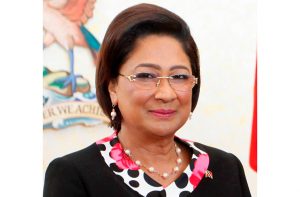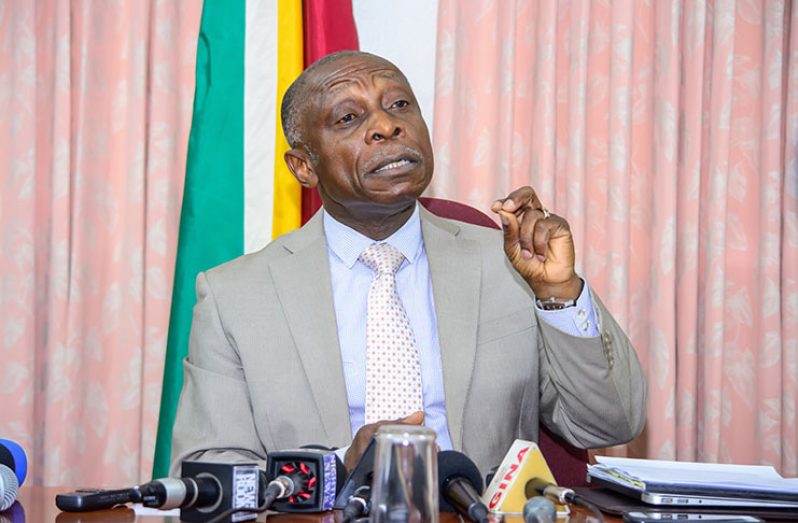– but has to be carefully considered, says Minister Greenidge
TRINIDAD and Tobago’s Prime Minister Dr Keith Rowley said the Oilfield Workers Trade Union (OWTU) will be given the first option to buy the Petrotrin refinery as the company shifts its focus to the extraction and export of crude oil.
But Opposition Leader of the twin-island republic Kamla Persad-Bissessar, has called on her government to partner with Guyana to refine its oil.
Reacting to the call, Guyana’s Foreign Affairs Minister Carl Greenidge said while the proposal might be good in principle, there are several critical areas that ought to be considered by Guyana before any decision is made.
Former Trinidad Prime Minister, now Leader of the Opposition, Kamla Persad-Bissessar has expressed the view that Trinidad should attempt to partner with Guyana – its CARICOM sister state – to refine its oil.
Prior to ExxonMobil’s 9th oil discovery here in the Stabroek Block days ago, it was estimated that Guyana had more than four billion oil-equivalent barrels. With this number expecting to increase with the latest oil find, Persad-Bissessar believes that her country should at least try to capitalise on this ‘golden opportunity’ that would salvage the island’s petroleum industry.
“I understand Guyana has found another well and they are producing, can we not group in some way and find a way to work together as a CARICOM (sic) where we can help them refine their oil?” the Trinidad opposition leader was quoted in Trinidad and Tobago Newsday.
Vice-President and Foreign Affairs Minister Carl Greenidge told the Guyana Chronicle that the idea is good in principle.

“These ideas of utilising spare capacity which the Region may have in anything to ensure that one makes the best of the resources that we have in the Region is one that is very commendable,” Minister Greenidge told this newspaper when contacted on Sunday.
However, he said for an industry as complicated as the oil and gas Industry or petroleum industry, consideration must be given to the specifics.
“The cost associated with the processing by the specific facility, volume is another dimension, and then there are a number of other issues to be examined as far as I am aware,” he explained, while reiterating that the idea is generally sound in principle, but there are specifics that must be addressed before any decision is taken.
He, however, noted that the two governments will soon sign a Memorandum of Understanding (MoU). “Guyana and Trinidad are looking at an MoU, covering in energy, and there will be later this month a conclusion of that MoU,” he posited.
Minister Greenidge alluded to the fact the Guyana government is in receipt of an ‘Oil and Gas Master Plan,’ which was developed and submitted by Mitsubishi Corporation and Chiyoda Corporation in collaboration with the Government of Japan.
The plan has as key objectives the development of Guyana’s domestic oil industry; the creation of a balance in the domestic usage and exportation of products from indigenous oil and gas; the harmonisation of the industry in keeping with Guyana’s ‘green’ development agenda; and the quantifying of the economic feasibility of the plans.
He noted that the Japanese Government has offered Guyana to undertake feasibility studies on a number of logistical areas which include a refinery. Those studies will be among reports that would inform government’s decision.
“So we will be informed by the feasibility studies as to what can and can’t be done. We would also look at what capacity there is in the Region,” the foreign affairs minister said.
In May, Pedro Haas, Director of Advisory Services at Hartree Partners which conducted a feasibility study for an oil refinery here, had revealed that the cost to construct a standard 100 barrel per day oil refinery would be US$5B.
Given the cost, Haas suggested that there be a creation of a robust unit within the Ministry of Finance, which should have both technical and professional relationship with the international oil companies exploring for oil here.
The expert had said as an alternative to the establishment of an oil refinery, it would be best for the government to maximise income from commercialising crude oil, swap or toll crude oil for products on the international market, create joint ventures with offshore refineries, as well as acquire stock in refining companies.
Haas said whether an oil company is state-owned, domestic or internationally operated, from the standpoint of the government and in the interest of the state, the creation of a fiscal authority body, which would have knowledge of the markets and taxes “in the proper way” is best. This, he noted, will enable a body to bring an educated discussion on the subject.



.jpg)









